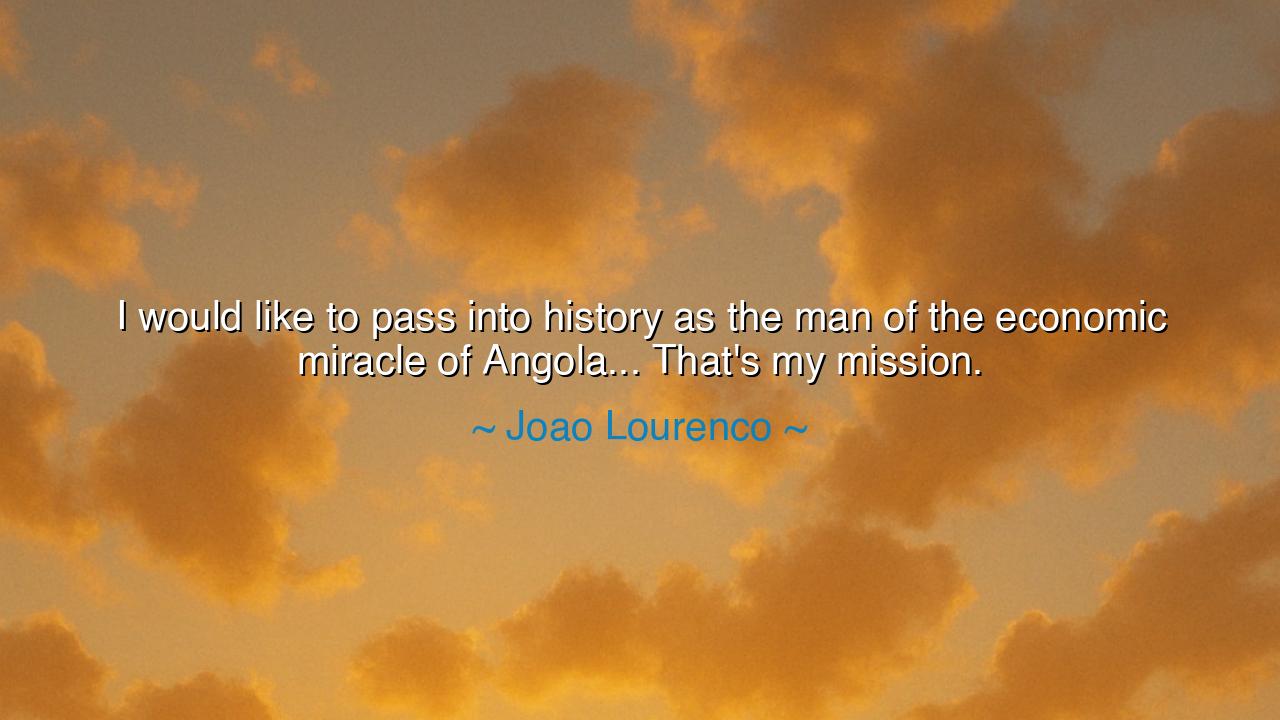
I would like to pass into history as the man of the economic
I would like to pass into history as the man of the economic miracle of Angola... That's my mission.






In a time when nations struggle to rise from the shadows of war and hardship, João Lourenço, the President of Angola, declared with clarity and conviction: “I would like to pass into history as the man of the economic miracle of Angola... That’s my mission.” These words are more than a political ambition—they are a testament to a leader’s yearning to transform suffering into prosperity, to turn the dust of despair into the fertile soil of renewal. Lourenço’s statement calls upon the timeless ideal of the builder-king, the one who does not seek glory for conquest, but for the creation of peace, dignity, and abundance for his people.
To understand the origin of this quote, one must look to Angola’s long and painful journey. For decades, this land of immense beauty and wealth was scarred by the wounds of colonization and the brutal years of civil war that followed independence in 1975. The war left fields barren, cities fractured, and hearts weary. Though peace returned in 2002, the promise of prosperity remained elusive. Corruption, inequality, and overdependence on oil cast long shadows over Angola’s future. When João Lourenço assumed power in 2017, he inherited not only a country but a crossroads—a chance to write a new chapter in its story. His words arose from that moment: a solemn vow to rebuild, to reform, to breathe life into the nation’s economy so that it might finally reflect the resilience of its people.
When Lourenço spoke of becoming the “man of the economic miracle,” he was not invoking arrogance but vision. He sought to follow the path of those who once turned their nations from ruin to renewal—the likes of Lee Kuan Yew, who lifted Singapore from poverty into prosperity, or Nelson Mandela, who guided South Africa from oppression toward unity. Such leaders understood that the true miracle of a nation lies not in sudden wealth, but in the awakening of its spirit—in honest governance, industrious people, and a shared dream of better days. Lourenço’s mission, therefore, is not merely economic—it is moral. It is the task of cleansing corruption, of making labor honorable again, and of ensuring that Angola’s riches—its oil, diamonds, and fertile land—serve not the few, but the many.
The ancients would have seen in Lourenço’s words the archetype of the healer-king—the ruler who comes after war not to conquer, but to heal the broken order of the world. Just as King Ashoka of India once turned from conquest to compassion, building hospitals and roads in place of armies and fortresses, so too does Lourenço seek to rebuild his nation not through might, but through wisdom. His “economic miracle” is the modern echo of what the sages of old called just rule—the harmony of power, justice, and prosperity, wherein the people thrive and peace endures.
Yet such a mission is not without struggle. To birth a miracle demands sacrifice. Lourenço faces a nation accustomed to dependence, to systems long entrenched in self-interest. Reform, like revolution, stirs resistance. But the man who seeks to “pass into history” does not fear hardship; he endures it for the sake of legacy. The great builders of civilizations—from Egypt’s architects to Japan’s reformers—knew that the work of creation is slow and sacred. It is the patient laying of stone upon stone, policy upon policy, until what was once broken stands whole again.
There is a story told of Mansa Musa, the ruler of the Mali Empire, who once journeyed to Mecca bearing wealth beyond imagination. Yet what made him great was not his gold, but his vision: he built schools, libraries, and cities that flourished long after his reign. Like Musa, Lourenço’s greatness will not be measured by the riches Angola holds, but by the foundations of knowledge, equity, and industry he leaves behind. His desire to be remembered as “the man of the economic miracle” is, at its heart, a pledge to lift his people from dependency to self-determination—to create a legacy not of monuments, but of minds awakened.
So let this be the lesson drawn from his words: true leadership is not about glory, but about service. The measure of a leader is not the wealth he amasses, but the hope he plants in the hearts of his people. Whether one rules a nation, leads a community, or simply guides a family, the call is the same—to leave the world better than it was found. Each of us can create our own “economic miracle” by laboring with honesty, by giving more than we take, and by daring to dream beyond the limitations of the present. For as Lourenço reminds us, history remembers not the boastful, but the builders—the ones who, through courage and conviction, turn the ashes of yesterday into the foundations of tomorrow.






AAdministratorAdministrator
Welcome, honored guests. Please leave a comment, we will respond soon